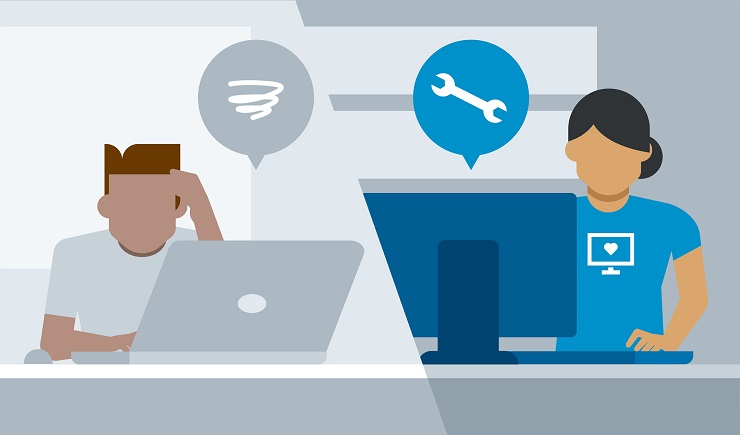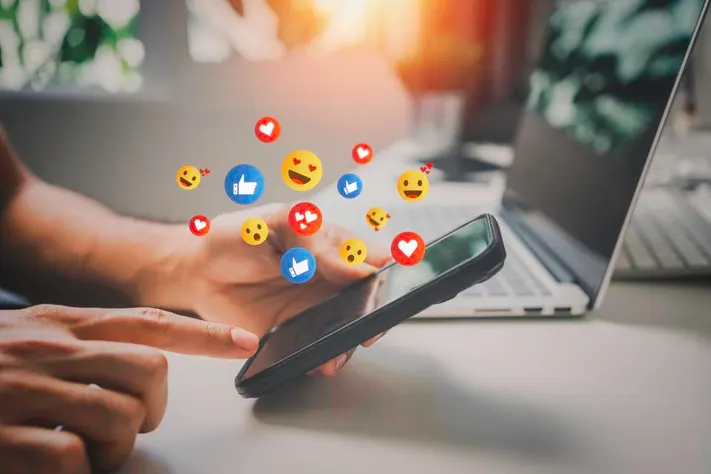Hello!
What if you could truly listen and understand what customers say about your brand or products? Social media listening makes it possible.
 It helps you:
It helps you:
- Uncover opportunities to improve your brand image to outshine competitors.
- Gauge how well your marketing message resonates with customers.
- Analyze trends and topics your customers are passionate about.
- Understand customer pain points and challenges.
Listening to your customers can help you create a more effective and meaningful social media strategy. In this blog, we’ll talk more about this and how social media listening can benefit your business.
Let’s start with the basics.
What is Social Listening?
Social listening is actively tuning into what people say about your brand, industry, and competitors across various platforms, including:
- News websites
- Review sites
- Social media
- Forums
This active listening process involves tracking mentions of your brand name, relevant keywords, and industry trends.
 By thoroughly examining these discussions, you can:
By thoroughly examining these discussions, you can:
- Gain actionable insights into customer sentiment
- Improve campaign performance tracking
- Better measure brand reputation
- Identify new industry trends
By keeping a pulse on these factors, you can make smarter, data-driven decisions that help improve your business’s bottom line.
Social Listening vs. Social Monitoring: Know the Differences
Social listening and monitoring are often used interchangeably despite their distinct purposes.
Social monitoring tracks specific mentions of your brand name, keywords, or campaign hashtags across social media platforms.
However, social listening looks beyond brand mentions and focuses on industry trends, competitors, and overall customer sentiment. Did your customers have positive, negative, or neutral experiences with your brand?
Think of social monitoring as reactive, where you focus on responding to direct mentions, addressing customer service issues, and managing brand reputation.
 In contrast, social listening is proactive, aiming to understand the “why” behind what people say. It uses valuable insights to improve brand strategy, identify opportunities, and gain a deeper market understanding.
In contrast, social listening is proactive, aiming to understand the “why” behind what people say. It uses valuable insights to improve brand strategy, identify opportunities, and gain a deeper market understanding.
Take the Beaches of Normandy Tours, for example. They leverage social media listening on Facebook to breathe new life into their website blog articles by reposting them.
These Facebook posts often trigger lively discussions, indicated by the many comments, likes, and even debates they generate.
For instance, their post about “Why did the U.S. declare war on Germany in World War I?” Is a great example of this, with over 600 reactions, 400 comments, and 30 shares.
By actively reading (or listening) to these conversations, Beaches of Normandy Tours can tailor future content to address specific user interests and questions, fostering a community around their brand.
Importance of Social Media Listening
Listening to what customers have to say about your brand and industry online can help boost your social listening strategy in the following ways:
1. Better Understand Your Audience
Social listening helps you gain valuable insights directly from your target audience and customers about their interests, preferences, and pain points.
Use these insights to customize your offerings, messaging, and strategies to better align with your audience’s needs.
For example, you may come across conversations in which individuals are seeking a resolution that your product or service can offer. This can help you improve your offering and make customers happier.
HubSpot’s dedicated X (formerly Twitter) account @HubSpotSupport exemplifies social listening in action.
 They listen and respond to customer queries and complaints. This helps them:
They listen and respond to customer queries and complaints. This helps them:
- Learn more about their audience
- Improve their services to meet customer expectations
- Build brand loyalty
2. Improve Customer Experience
Social listening can help you discover customer issues with your product or services. How? Paying special attention to feedback and online conversations around your brand.
If you come across certain issues that are repetitive, you should act on them immediately before they escalate. By proactively addressing those concerns, you can improve the overall customer experience. Additionally, understanding who Qualtrics’s competitors are can help you tailor your strategy to better position your product or service.
Nike, for example, addressed negative feedback immediately in the tweet below and assured them they’d look into this to build trust and offer a better experience.
3. Create Targeted Content
Social media listening has emerged as a crucial tool for businesses aiming to connect deeply with their audience and navigate swiftly evolving industry landscapes.
 Platforms like X (formerly Twitter), Facebook, and Instagram offer many insights that savvy companies can leverage to inform strategic decisions. This isn’t just limited to any specific industry or business but applies to all types of companies like online businesses, healthcare, SaaS businesses, etc.
Platforms like X (formerly Twitter), Facebook, and Instagram offer many insights that savvy companies can leverage to inform strategic decisions. This isn’t just limited to any specific industry or business but applies to all types of companies like online businesses, healthcare, SaaS businesses, etc.
Take, for instance, understanding the increasing demand for mental health support, especially in regions like Florida, which could lead healthcare providers to explore options such as residential mental health facilities in Florida. By employing social media listening, these facilities can tap into their target audience’s specific anxieties and concerns.
For example, these facilities can highlight the rising drinking problems in Florida and can craft tailored content addressing these issues head-on, offering solutions and support.
We see this in action with We Level Up Treatment Centers, whose social media channels actively engage with their audience, addressing prevalent health and addiction concerns in their service regions.
By leveraging social media listening, they empower individuals to overcome challenges while showcasing how their residential mental health facilities can be part of the solution.
4. Identify and Engage with Brand Advocates
 The other key advantage of social media listening is that it helps you identify potential brand advocates. These individuals might have frequently shared their positive feedback with your brand or defended it in online debates.
The other key advantage of social media listening is that it helps you identify potential brand advocates. These individuals might have frequently shared their positive feedback with your brand or defended it in online debates.
You can recognize these advocates with the help of social listening and engage with them to turn them into fervent supporters. There are many ways to engage with them, from simply acknowledging to thanking them for their support or providing exclusive offers and access to your products.
Going the extra mile will help them feel seen and valued, further strengthening brand loyalty.
5. Gain Competitive Edge
Social media listening isn’t just about tracking brand mentions but also tracking your competitors. This helps you identify what your audience is saying about them.
Specifically, you learn what features your audience likes the most about your competitor’s product or services. You can even discover strategies your competitors are adopting for customer engagement or boosting customer experience.
These meaningful insights can help you identify areas for improvement. Spotting areas where you excel compared to competitors allows you to emphasize these strengths in your marketing approach. Thus, competitive analysis with social media listening can help you stay ahead of the curve.
6. Identify and Manage Crisis
Crises can affect any business, big or small, in any industry or location. No brand is exempt.
Social media has shifted influence from brands to customers, allowing them to share their opinions widely. Brands have little to no control over customers’ opinions about their products, services, or overall business. As a result, effective crisis management is now crucial.
 Crisis or reputation management influences public perception of your brand to minimize harm to your business or its stakeholders. Social listening lets you stay on top of customer conversations and detect negative sentiment surrounding your brand.
Crisis or reputation management influences public perception of your brand to minimize harm to your business or its stakeholders. Social listening lets you stay on top of customer conversations and detect negative sentiment surrounding your brand.
If you see a sudden increase in negative comments or sentiment, it’s crucial to identify the root cause of the issue. This will enable you to take quick action and mitigate the impact of the crisis.
7. Identify Market Trends
Social media has been constantly evolving. What’s trending today can be outdated tomorrow. To keep your content strategy effective, it's crucial to track and adapt to these trends.
Social media listening can help you predict future trends by analyzing how conversations have changed. Therefore, you can focus on relevant topics and drop those without a purpose.
These insights can significantly shape your approach to content marketing, product design, and promotional efforts.
 For example, a trending topic on social media, talked about by many influencers and celebrities, is weight loss and, along with it weight loss medications like Wegovy. While this trend is beneficial for telehealth companies, they also need to listen to the other side of the social media discussion, which raises concerns about body image and drug safety for teens when it comes to these topics.
For example, a trending topic on social media, talked about by many influencers and celebrities, is weight loss and, along with it weight loss medications like Wegovy. While this trend is beneficial for telehealth companies, they also need to listen to the other side of the social media discussion, which raises concerns about body image and drug safety for teens when it comes to these topics.
There’s been a lot of backlash about the way these brands are marketing their products. This goes to show the importance of social listening for both positive and negative sentiments around a product or brand.
The goal? Identify areas of misconception and adapt your content to provide educational information rather than content that can be misconstrued.
8. Customer Relationship and Acquisition
People love it when brands genuinely try to solve their problems. However, they don’t like brands joining social conversations for a hard sell.
 Social media listening tools can help you uncover online questions and relevant conversations about your brand or industry. But looking at those conversations to sell immediately isn’t the best approach.
Social media listening tools can help you uncover online questions and relevant conversations about your brand or industry. But looking at those conversations to sell immediately isn’t the best approach.
Instead, you can join those conversations with the idea of building relationships and then slowly nurturing them into customers. This will help build authority, and your brand will emerge as the best resource to refer to when it comes to making a purchase decision.
For example, if you’re a digital marketing agency and discover conversations around increasing inbound leads.
Instead of selling your courses or highlighting how your agency can help, you can share tips and tricks. This will help you build genuine connections that can be converted into sales later.
Also read:
- Growing Your Small Business: Tech Solutions For Modern Challenges
- How a Corporate Blog Is an Essential Part of Your Website
- How to increase ad revenue for your casual game: 3 case studies from app developers
Leverage Social Media Listening to Scale Your Business!
Social media listening is a powerful tool for winning in the sea of social media chaos.
Zero in on the key discussions that truly matter. By focusing sharply, you'll gain a clearer understanding of your customers' needs and desires.
 Start by identifying relevant keywords and hashtags to track — what are your customers saying about your brand, industry, and competitors?
Start by identifying relevant keywords and hashtags to track — what are your customers saying about your brand, industry, and competitors?
Uncovering this information with social media listening can be the competitive advantage you’ve always craved.
With the proper approach, it can quickly become your gateway to a goldmine of customer insights.
Don’t sleep on this strategy to build a brand that always stays one step ahead!
Thank you!
Join us on social media!
See you!






